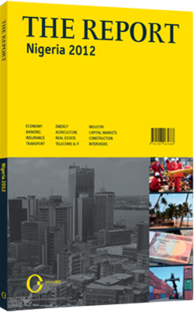First Bank: Banking
THE COMPANY: First Bank of Nigeria has diverse operations in the Nigerian financial services industry, rendering it a top financial service provider. The First Bank Group has 717 branches and 1600 automatic teller machines nationwide. It maintains strong ratings across the board and received a BS 25999 certification in Business Continuity Management Systems from the British Standards Institute, validating its framework based on international best practices to managing business continuity and it ability to achieve key business objectives even with major or minor disruptions.
1Q12 RESULTS ANALYSIS: Gross earnings rose to N92.3bn ($590.7m), up from N64.8bn ($414.7m) in 1Q11, thanks to growth in interest and non-interest income of 51% and 27%, respectively. Operating income recorded a 50.2% growth to N74.2bn ($474.9m), driven by a deeper market share for existing product offerings. Profit before taxes for 1Q12 rose 102% to N28.85bn ($184.6m), up from N14.31bn ($91.6m) in 1Q11, derived from strong revenue growth as the bank optimises revenue streams to drive the bottom line. First Bank’s earnings remained the highest among its peers, leading Guaranty Bank and Zenith Bank’s 1Q12 gross earnings by 43% and 22%, respectively. This growth came on the back of growing business volumes, increasing segment specialisation, customer acquisition, innovative product development, rising yields and margin expansion.
The bank’s cost-to-income ratio fell to 60.9% from 70.3% in 1Q11. The improvement was due to an expanding revenue base and a better earning assets mix. Impairment charge for credit losses came to N5.42bn ($34.7m) in 1Q12, compared to N4.57bn ($29.2m) in 1Q11 on account of better classification. Interest expense rose 35% to N12.7bn ($81.3m), up from N9.4bn ($60.2m) in 2011, reflecting growth in deposit volumes, the general interest rate environment and competition for customer deposits. Profit after taxes grew to N24.5bn (156.8m) from N12.2bn ($78.1m) in 2011.
First Bank recorded a stronger and more liquid balance sheet with a capital adequacy ratio of 19.9% in 1Q12. The tier 1 capital ratio stood at 16.3%, while the gross loan-to-deposit ratio came in at 64.3%. Year-on-year, net loans and advances grew 4% to N1.3trn ($8.3bn). Total deposit increased by 31.1% to N2.1trn ($13.4bn), up from N1.6trn ($10.2bn) in 1Q11, while the non-performing loan ratio was 2.7%. Total assets stood at N2.98trn ($19.1bn) in 1Q12. The improved balance sheet position came in as deposit and funding mixes grew by 24% and 15% to N2.01bn (12.9m) and N2.998bn ($19.2m), respectively.
DEVELOPMENT STRATEGY: First Bank’s strategic objectives include: delivering superior shareholder value through growth and profit maximisation; expanding the bank’s leadership in customer satisfaction, employment desirability and capital efficiency; and positioning the bank to lead in the rapidly evolving market.
For profit maximisation and margin expansion, First Bank has begun implementing changes to its asset pricing framework and methodologies to boost yields of loan portfolios. To further optimise net interest margins, the bank will begin low-cost deposit mobilisation.
The bank aims to decrease its cost-to-income ratio from 57% at year-end 2011 to 55% by 2013. Following the central bank’s directive to divest from non-core banking operations, First Bank adopted a holding company structure to offload some subsidiaries while others, including First Bank, became subsidiaries of the umbrella firm, FBN Holdings. FBN Holdings will list on the Nigerian Stock Exchange before the end of 2012, pending regulatory and shareholder approval.
First Bank has adopted a risk-based pricing strategy and strengthened risk management systems. Risk appetite thresholds are based on business realities, prudent guidelines and a strategic thrust as defined in the bank’s credit portfolio. Following the sale of the Seawolf loan to the Asset Management Corporation of Nigeria (AMCON), the bank’s risk portfolio is lighter.
The outlook on First Bank shows strong earnings growth on the back of consistent improvement of operating structures and investment in critical technologies.
You have reached the limit of premium articles you can view for free.
Choose from the options below to purchase print or digital editions of our Reports. You can also purchase a website subscription giving you unlimited access to all of our Reports online for 12 months.
If you have already purchased this Report or have a website subscription, please login to continue.

